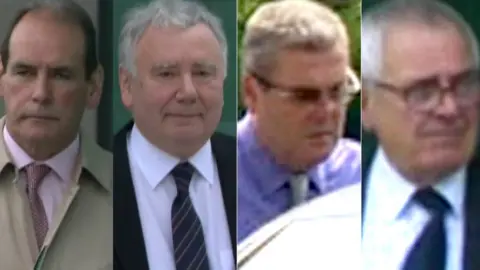Hillsborough: Criminal charges explained
The Crown Prosecution Service's decision that there is sufficient evidence to charge six people over Hillsborough - including a former chief constable - is massive. This has been a complicated process and the charges need some explanation.

The six who the CPS has authorised to be charged are:
- David Duckenfield: The match commander for South Yorkshire Police on the day of the disaster. He is expected to be charged with gross negligence manslaughter.
- Norman Bettison, a former officer with South Yorkshire Police and later Chief Constable of Merseyside and then West Yorkshire. He will face four charges of misconduct in a public office.
- Peter Metcalf, the solicitor for the South Yorkshire Police during the original inquiry and first inquests. He is accused of perverting the course of justice.
- Graham Henry Mackrell, then Sheffield Wednesday's company secretary, is accused of breaches of health and safety laws.
- Former Chief Superintendent Donald Denton and former Detective Chief Inspector Alan Foster, both of South Yorkshire Police, are accused of perverting the course of justice.

What happens next?
Five of the six have been served with a summons - that's a legal procedure ordering them to appear in court for the formal start of their prosecutions. The exception is Mr Duckenfield. He can't yet be summonsed or charged because the CPS must ask the High Court to lift an order preventing a trial following his private prosecution by families in 1999.
The CPS will apply for that order to be lifted and, assuming the High Court agrees, his prosecution on a charge of gross negligence manslaughter of 95 men, women and children will then proceed. Assuming that order is lifted, 95 manslaughter allegations may be something of a record under English law.
Why is he not expected to be charged with the manslaughter of 96? Tony Bland, the final victim, died four years after the disaster after his life support was withdrawn. At the time of his death, an ancient English law stated that nobody could be found guilty of homicide if the death occurred more than a year and day after the date of the injuries.
That law has since been abolished - but it cannot be applied retrospectively, so there can be no manslaughter charge in relation to Mr Bland's death.

What is gross negligence manslaughter?
This offence is an important plank of homicide law. In most cases, someone accused of a homicide will be charged with either murder, meaning a deliberate killing, or manslaughter, meaning a death caused by a criminal action where there was no immediate intention to kill.
The third less common category of prosecution is gross negligence manslaughter. A suspect can be found guilty of this offence if a jury is sure the deaths were the result of a "grossly negligent act or omission". The prosecution must first prove that a defendant in such a case had some kind of "duty of care" towards the dead.
Secondly, the jury must be sure that the individual's decisions - or lack of action - breached that duty and caused the death. It can't just be a case of a simple mistake - prosecutors have to prove that the defendant's behaviour was so bad as to be reprehensible and outside what a reasonable person would do in the same position.
In the case of Mr Duckenfield, the CPS says it will allege in court that his failures to discharge his personal responsibility were "extraordinarily bad".
The maximum sentence for gross negligence manslaughter is life - but in practice it has the widest range of possible sentences.

What allegation does Sir Norman Bettison face?
The twice former chief constable was a chief inspector at South Yorkshire Police at the time of the disaster. He faces four offences of "misconduct in public office" which the CPS says relates to "telling alleged lies about his involvement in the aftermath of Hillsborough and the culpability of fans".
This is a complicated offence, which also has a maximum life sentence. It hit the headlines when it was used to prosecute police officers who had taken payments from journalists.
The only people who can be charged with this crime are those who have some kind of job in public life - such as police officers, civil servants or employees of another public body.
Prosecutors must prove that the public office holder either deliberately neglected their duty or deliberately acted in such a way that they breached the public's trust. This has long proven quite difficult to define but senior judges have previously said the alleged misconduct is only a crime if the actions amount to "an affront to the standing of the public office held."
 Hillsborough Inquests
Hillsborough Inquests
What is perverting the course of justice?
This is the criminal charge faced by three of the six - Mr Metcalf, Mr Denton and Mr Foster. It's one of the most important and serious criminal laws and covers actions that send an official inquiry, such as a police investigation, down the wrong track.
Mr Metcalf was a solicitor instructed to represent South Yorkshire Police and the CPS says he reviewed accounts provided by officers and made "suggestions for alterations, deletions and amendments ... and for which there appears to be no justification."
The CPS says those changes were allegedly directly relevant to the first inquiry's expected criticism of specific individuals.
Prosecutors say the charges faced by former Chief Superintendent Donald Denton and former Detective Chief Inspector Alan Foster relate to alleged changes to statements made by other officers.

What about the health and safety allegations?
There are a range of laws that cover health and safety at work or in other public places - and people responsible for those locations have a duty under those laws to make sure the location is safe.
Mr Mackrell, the sixth defendant, was Sheffield Wednesday's company secretary and safety officer at the time of the disaster. The two charges he faces concern allegations that he failed to carry out his duties as required under these laws.